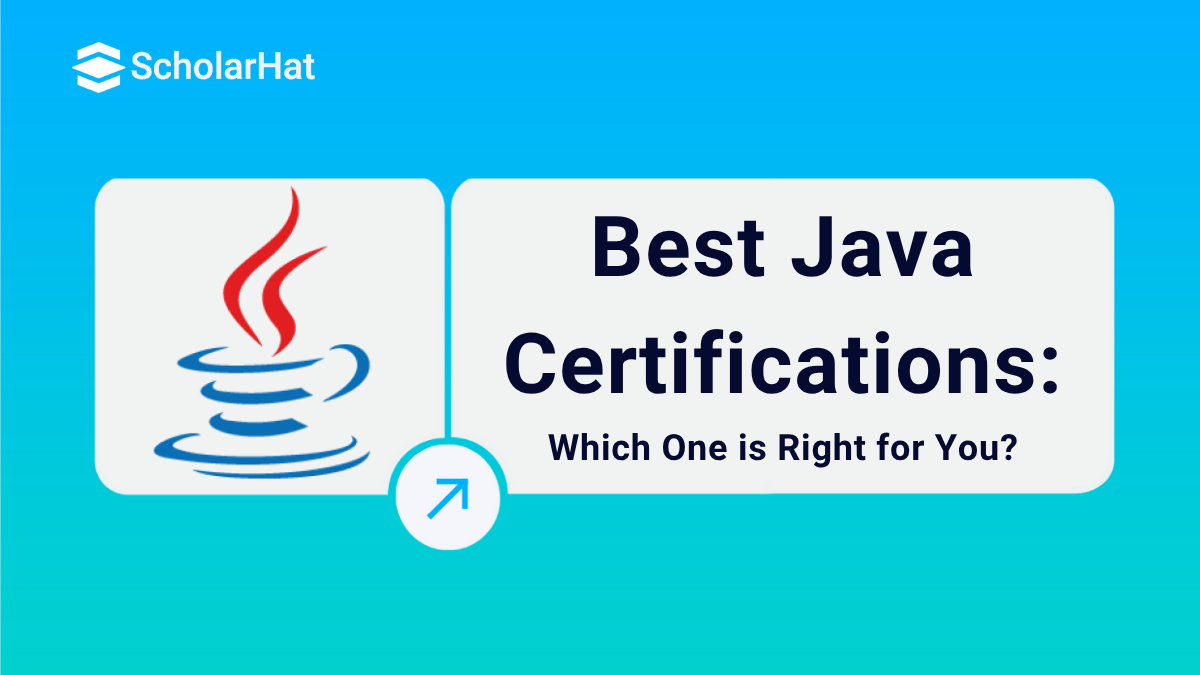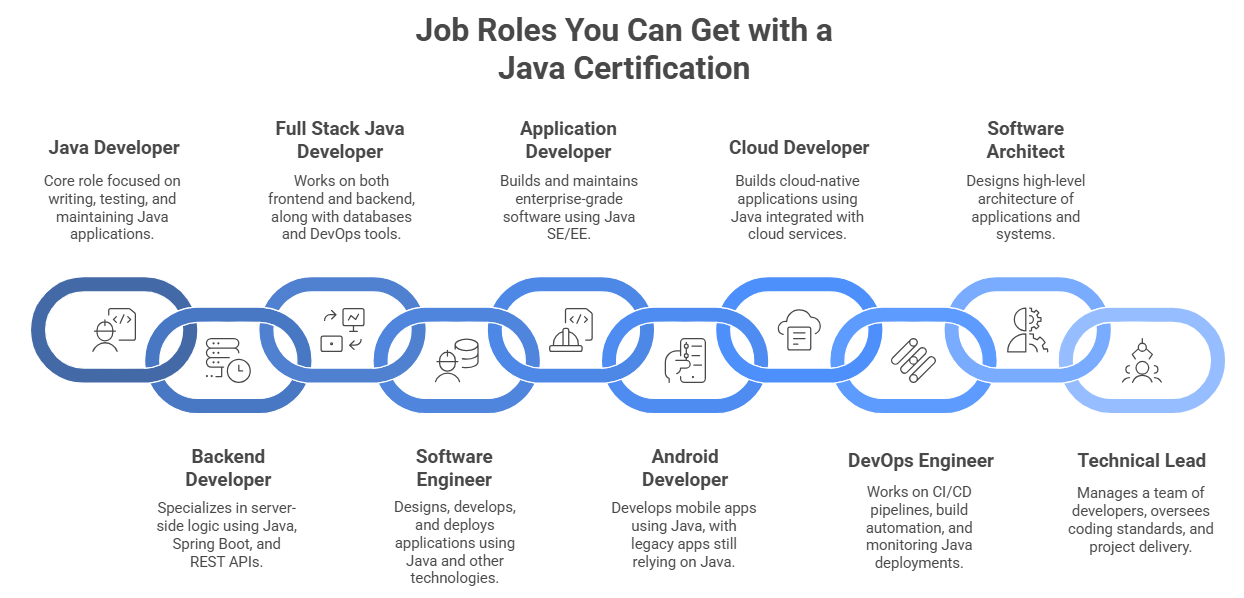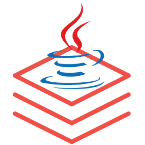13
FebBest Java Certifications in 2025: Which One is Right for You?
In this Java Tutorial, you will explore the Best Java certifications starting the article with what is a java certification, Is a java certification worth it in 2025, what jobs can You Get with a java certification, best java courses and certifications for beginners, benefits of Java certification and courses and how to choose the right java course. If you want to learn Java programming? Enroll in our Free Java Certification Course to boost your skills.
What is a Java Certification?
A Java certification is an industry-recognized credential that validates your knowledge and expertise in Java programming. Java is a high-level, object-oriented, platform-independent, programming language. Java is mostly used for building desktop applications, web applications, Android apps, and enterprise systems. Java certification involves several steps:
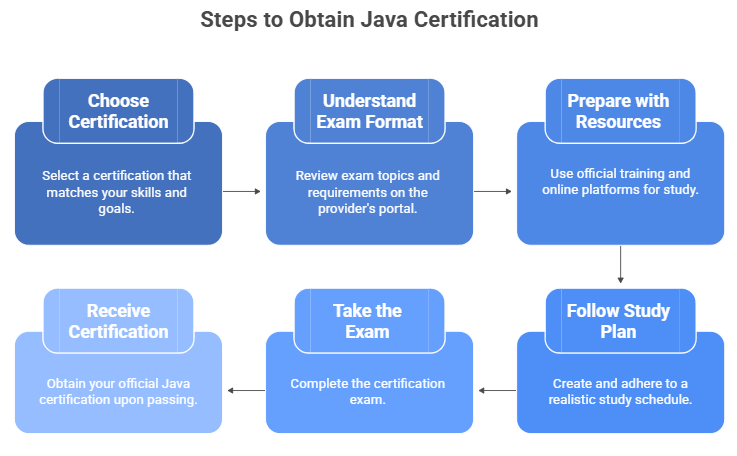
- Choose the Right Certification: Start by selecting a Java certification that aligns with your current skill level and career goals. In this tutorial you will get to know which certificate is best for you.
- Understand the Exam Format: Visit the official certification provider’s portal (e.g., Oracle or Red Hat) to review exam topics, formats, and requirements.
- Prepare with Study Resources: Use official training modules, documentation, and online platforms like Udemy, Coursera, or Oracle’s learning library to prepare effectively.
- Follow a Study Plan: Create a realistic study schedule based on your timeline and stick to it.
- Take the Exam: Once you're prepared, take the certification exam. If you pass, you’ll receive your official Java certification, boosting your resume and career potential.
Best Java Certifications:
| Certificate Name | Job Profile | Features | Syllabus | Cost | Exam Pattern |
| Oracle Certified Professional: Java SE 11 Developer | Java Developer, Software Engineer | Proficiency in Java SE | Java Basics, OOP, APIs, Modularization | $245 or ₹20,335 | 50 MCQs, 90 mins |
| Oracle Certified Master: Java EE 6 Enterprise Architect | Java Architect, Technical Architect | Advanced architecture skills | Design Patterns, Security, Deployment | $1,000+ or₹83,000+ | Multi-phase (MCQ, Assignment, Essay) |
| AWS Certified Developer – Associate | AWS Developer, Cloud Engineer | Cloud app development | AWS SDKs, CLI, IAM, Lambda | $150 or ₹12,450 | 65 MCQs, 130 mins |
| Oracle Certified Professional: Java SE 8 Programmer | Java Developer, Software Engineer | Expertise in Java 8 | OOP, Lambda, Streams, Collections | $245 or₹20,335 | 70 MCQs, 150 mins |
| Spring Professional Certification | Spring Developer, Full Stack Developer | Spring Framework expertise | Spring Core, REST, Security, Boot | $250 or ₹20,750 | 50 MCQs, 90 mins |
| Microsoft Certified: Azure Developer Associate | Azure Developer, Cloud Application Engineer | Azure app development | SDKs, APIs, Deployment, Monitoring | $165 or ₹13,695 | ~60 MCQs, 100–120 mins |
| Oracle Certified Expert: Java EE 7 Application Developer | Enterprise Java Developer, Backend Developer | Java EE Proficiency | Servlets, JSP, JPA, EJB, Web Services | $245 or ₹20,335 | 70 MCQs, 150 mins |
| IBM Certified Application Developer – Cloud Platform | IBM Cloud Developer, Application Developer | IBM Cloud expertise | DevOps, Containers, APIs, Microservices | $200 or ₹16,600 | 60 MCQs, 90 mins |
| Red Hat Certified Enterprise Application Developer (RHCJD) | Java EE Developer, Red Hat Middleware Developer | Proficiency in enterprise Java development using Red Hat technologies | JPA, CDI, RESTful services, JMS, WebSocket, Bean Validation, JSF | $400 or or₹33,200 | 3-hour hands-on practical exam (EX183) |
| ScholarHat Advanced Java Course (Certification) | Java Backend Developer, Full Stack Developer | Hands-on training in Advanced Java, projects, job-focused modules | JDBC, Servlets, JSP, Hibernate, Spring Boot, REST APIs, Mini-projects | $399 or ₹33,000 | Assignment + Project + Quiz (internally evaluated) |
Why You Should Enroll in Java Certification?
Java continues to stand strong as one of the most in-demand programming languages across industries—from mobile development and enterprise software to cloud-based applications and fintech systems. Getting Java certified or enrolling in a top-rated online Java course is not just smart—it’s essential.Java Skills Are Still in High Demand
- The demand for Java developers is projected to grow by 13% in the next four years, opening up over 20,000 new jobs in the coming decade.
- Core sectors like finance, banking, and healthcare favor Java for its security, reliability, and scalability.
Certification Adds Real Value to Your Resume
- Java certifications (like Oracle Certified Professional, Spring, or Red Hat) serve as proof of your technical skills.
- Employers prefer candidates with verified certifications
Getting Top Job roles with Java Certification
- Java courses unlock high-demand roles like Java Developer, Backend Developer, and Full Stack Java Developer.
- With certification, you can land roles like Software Engineer, DevOps Engineer, or Technical Lead in top companies.
Java Opens Multiple Career Paths
Mastering Java gives you the base to specialize in modern frameworks like:
- Spring Boot for backend APIs.
- Hibernate for database integration.
- Apache Hadoop for big data analytics.
Best Java Certifications in Detail
1. Oracle Certified Professional: Java SE 11 Developer
- Validates core Java SE 11 programming skills
- Covers modular programming and new language enhancements
- Recognized globally by employers for Java proficiency
- Java basics and object-oriented programming (OOP)
- Exception handling, functional interfaces, lambda expressions
- Java APIs, collections, streams, file I/O
- Modular programming (JPMS) and concurrency basics
2. Oracle Certified Master: Java EE 6 Enterprise Architect
- Highest-level Oracle Java certification for enterprise architecture
- Demonstrates ability to design scalable, secure, and robust Java EE applications
- Includes assignment and essay — tests both practical and theoretical expertise
- Enterprise architectural design principles
- Java EE technologies (JPA, EJB, JMS, JSF, JAX-RS, JAX-WS)
- Security, scalability, and performance tuning
- UML modeling, design patterns, and integration strategies
- Deployment and infrastructure planning
- Part 1 – Multiple Choice Exam: 60 questions in 150 minutes, covering architectural principles and Java EE specifications.
- Part 2 – Assignment: Candidates are given a real-world business scenario and must submit a detailed architectural solution (diagrams + documentation).
- Part 3 – Essay Exam: 8 scenario-based questions where candidates justify their Part 2 decisions (completed in 120 minutes).
3. AWS Certified Developer – Associate
- Validates expertise in developing, deploying, and debugging cloud-based applications using AWS
- Suitable for Java developers building scalable cloud apps
- Recognized industry-wide for cloud development roles
- AWS core services (Lambda, DynamoDB, S3, SQS, SNS, API Gateway)
- Writing code for serverless applications
- Application lifecycle management
- Monitoring and troubleshooting AWS apps
- Security and deployment using IAM, CloudFormation, and CI/CD tools
4. Oracle Certified Professional: Java SE 8 Programmer
- Validates proficiency in Java SE 8 programming and syntax
- Emphasizes OOP, functional programming, and lambda expressions
- Recognized by employers as a core certification for Java professionals
- Java Class Design, Object-Oriented Principles
- Functional programming (Lambdas and Streams)
- Java APIs, Collections, Date/Time API
- Exception handling, assertions, and localization
- File I/O (NIO.2), concurrency basics
5. Spring Professional Certification (VMware)
- Validates in-depth knowledge of Spring Framework (5.x)
- Official certification from VMware (previously Pivotal)
- Highly valued by companies using Spring Boot, Spring Cloud, and microservices
- Spring Core (IoC, Dependency Injection, AOP)
- Spring MVC (Web, REST APIs)
- Spring Boot (Auto-configuration, Starter Projects)
- Spring Data JPA, Spring Security, Spring Testing
- Spring Cloud and Microservices basics
- Format: Online, proctored exam
- Number of Questions: 50 multiple-choice questions
- Duration: 90 minutes,Passing Score: 76%
6. Microsoft Certified: Java Developer (Azure)
- Focuses on Java development within the Microsoft Azure ecosystem
- Validates skills in building, deploying, and scaling Java applications using Azure services
- Recognized in enterprise environments for cloud-native Java application development
- Java application development fundamentals
- Deploying Java apps using Azure App Services, Azure Spring Apps
- Integrating with Azure services (like Cosmos DB, Azure Monitor)
- CI/CD pipelines using GitHub Actions and Azure DevOps
- Monitoring, security, and troubleshooting in cloud environments
7. Oracle Certified Expert: Java EE 7 Application Developer
- Validates expertise in developing enterprise-level applications using Java EE 7
- Focuses on key technologies like Servlets, JSP, EJB, JPA, and RESTful web services
- Preferred by companies building scalable and secure enterprise solutions
- Java EE architecture and deployment
- Servlets and JavaServer Pages (JSP)
- Enterprise JavaBeans (EJB) and dependency injection
- Java Persistence API (JPA)
- Building RESTful web services and handling security in enterprise apps
8. IBM Certified Application Developer – Cloud Platform
- Demonstrates ability to develop and deploy cloud-native applications using IBM Cloud
- Covers DevOps, microservices, containers (Docker, Kubernetes), and IBM Cloud tools
- Recognized by enterprises leveraging IBM Cloud solutions
Syllabus:
- IBM Cloud Foundational concepts
- IBM Cloud CLI, IBM Cloud DevOps services
- Java-based application deployment on IBM Cloud
- Continuous Delivery, Toolchains, GitOps
- Kubernetes, Cloud Functions (serverless)
- Monitoring and logging using IBM Cloud tools
9. Red Hat Certified Enterprise Application Developer (RHCJD)
- Focused on enterprise-level Java development using Red Hat JBoss and Jakarta EE
- Recognized in large-scale enterprise environments and government sectors
- Emphasizes hands-on coding skills in a performance-based test
- Developing web applications using Servlets and JSP
- Working with RESTful and SOAP-based web services
- JPA and database persistence
- CDI (Contexts and Dependency Injection), Stateless and stateful EJBs
- Integration with messaging systems (JMS)
- Format: Performance-based practical exam
- Code: EX183,Duration: 3 hours, Environment: Real-world coding scenarios in a live Red Hat environment
- Passing Score: 210 out of 300
ScholarHat Java Certification
10. Advanced Full-Stack Java Developer with AWS & AI Integration
An Advanced Full-Stack Java with AWS Course is an expert who designs and architects modern applications all stack like UI, Back-end, database, version control, server and APIs. This training will help you to understand Java, REAT API, Angular or React, and AWS. This path will prepare you to become a certified advanced Full-stack Java developer and land your dream job in top MNCs.
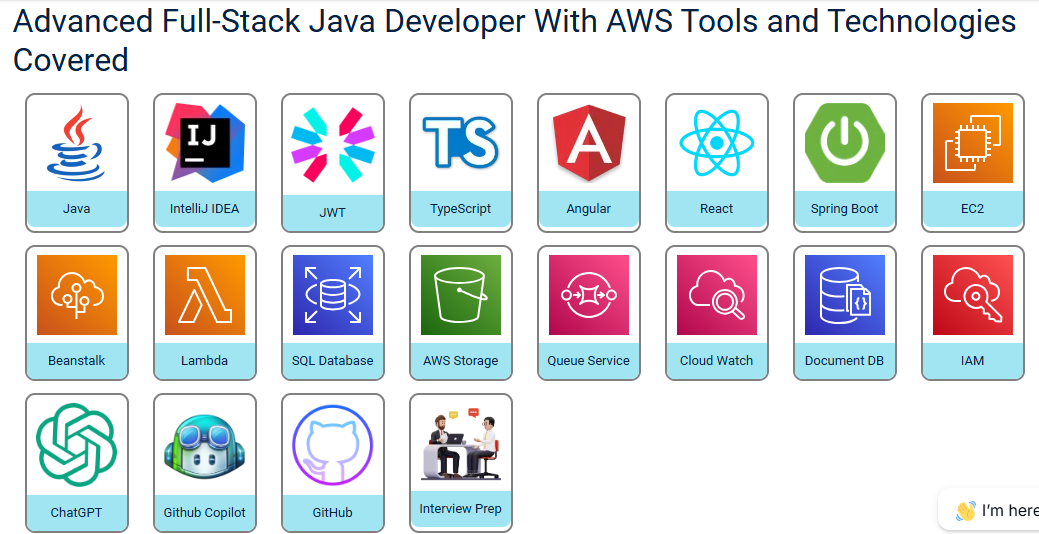
- Backend: Java, Spring Boot, REST APIs
- Frontend: Angular or React, JavaScript (ES6)
- Cloud: AWS Developer Tools, CI/CD Integration
- Projects: Guided (Domino’s), Independent (Coursera)
- Career Coaching: Resume building, mock interviews, personal branding
- Bonus: AI Integration with Java
11. Java Solution Architect Certification Training
- Proven curriculum designed to help you secure a Solution Architect role with potential earnings up to ₹50 LPA*
- 6 months of intensive live training with real-time guidance from experienced Software Architects
- Learn software design principles, enterprise-grade application development, and system scaling techniques
- Hands-on learning with 55+ coding labs and 2 end-to-end real-world projects
- Integration of DevOps practices into project development for industry readiness
- Career and interview coaching, including Solution Architect interview Q&A preparation
- Software Architecture Foundations: Principles, design patterns, and architecture styles
- Java Enterprise Development: Building scalable and maintainable backend systems
- System Design & Scalability: Designing systems to handle millions of users.
- DevOps Integration: CI/CD pipelines, containerization, and cloud deployment practices
- Project Work: Develop two enterprise-grade applications with full DevOps lifecycle
- Interview Readiness: Practice sessions and Q&A for Solution Architect interviews
- No single final exam , assessment is continuous through projects, coding assignments, and design reviews
- Certificate awarded upon successful completion of training and project evaluations
12. Java Online Free Course With Certificate
Job Profile: Java Developer, Backend Developer, Software Engineer, Android Developer, Full-Stack Developer, DevOps Engineer, Data Engineer
Features:
- 100% free beginner-friendly curriculum designed for students, job seekers, and working professionals
- Covers Java basics to advanced concepts including OOPs, exception handling, file I/O, collections, and multithreading
- Hands-on practice with coding examples and mini-projects to build real-world skills
- Interactive lessons combining video tutorials and practical coding labs
- Self-paced learning with 24/7 access to all materials
- Free certificate upon completion to showcase your skills to employers or clients
Syllabus:
- Java Fundamentals: Variables, data types, operators, control statements
- Object-Oriented Programming: Classes, objects, inheritance, polymorphism, encapsulation, abstraction
- Exception Handling & File I/O: Handling runtime errors, working with files
- Data Structures & Collections: Lists, sets, maps, queues
- Multithreading: Thread creation, synchronization, concurrency handling
- Mini-Projects: Build simple applications applying the concepts learned
- Tools & Practices: Using IDEs like IntelliJ IDEA, Eclipse, or NetBeans; practicing version control with Git
Cost: $0 USD / ₹0 (Completely Free of Cost)
Exam Pattern:
- No final proctored exam — assessment through quizzes and coding assignments
- Free certificate awarded automatically upon course completion
Official Link: Java Online Course Free With Certificate – ScholarHat
How to Choose Best Java Course for Your Career?
Choosing the right Java course depends on your career goals, current skill level, and preferred learning style. Here's a guide to help you decide:
1. Assess Your Current Skill Level
- Beginner: Choose a course that covers core Java, OOP, and basic syntax.
- Intermediate: Look for courses with projects, JDBC, collections, multithreading, and intro to frameworks.
- Advanced: Opt for full-stack Java courses or certifications that include Spring Boot, microservices, cloud integration (AWS), and DevOps tools.
2. Define Your Career Goal
- Want to become a backend developer? Focus on Java, Spring Boot, and REST API.
- Aiming for full-stack development? Choose a course with React or Angular + Java.
- Interested in enterprise systems? Look for Java EE or Red Hat-backed certifications.
- Targeting cloud roles? Choose courses with Java + AWS or Azure modules.
3. Check Course Features
- Includes certification of completion
- Offers live projects and hands-on coding
- Has industry expert instructors
- Includes interview prep and placement support
4. Budget & Duration
- Set a realistic budget.
- Decide how much time you can commit (self-paced, weekend batches, or bootcamps).
How to Prepare for Java Certification Exam?
Preparing for a Java certification exam requires a disciplined and structured approach. Here are actionable steps:
1. Understand the Exam Objectives
- Start with the official syllabus from the certification provider (e.g., Oracle, Microsoft, AWS).
- Note topics like OOP, streams, lambda expressions, modules, multithreading, exception handling, and API usage.
2. Choose the Right Study Materials
- Use official study guides (like “OCP Java SE 11 Programmer I & II Study Guide”)
- Enroll in courses aligned with the exam syllabus
- Practice with coding platforms like LeetCode, HackerRank, or CodeSignal
3. Follow a Daily Study Plan
- Dedicate 1–2 hours daily or 10–12 hours
- Break the syllabus into weekly goals (e.g., Week 1: OOP, Week 2: Exceptions and Collections)
4. Practice with Mock Exams
- Take regular mock tests to simulate the exam
- Analyze incorrect answers and revisit weak topics
5. Hands-on Coding
- Build small projects using Java concepts
- Practice writing clean, efficient, and modular code
- Understand the logic behind solutions, not just the syntax
Conclusion
Java certifications and advanced courses offer a powerful way to validate your skills, stand out in the job market, and accelerate your software development career. Whether you're a beginner seeking foundational knowledge or a professional aiming to master cloud-native or full-stack Java development, there’s a certification or course tailored to your goals.
Although if you really want to pursue JAVA but you don't know where to start..? Start with Scholarhat's Full-Stack Java Developer Course and master Java, AWS, and AI integration — all in one program.
FAQs
Take our Java skill challenge to evaluate yourself!

In less than 5 minutes, with our skill challenge, you can identify your knowledge gaps and strengths in a given skill.

